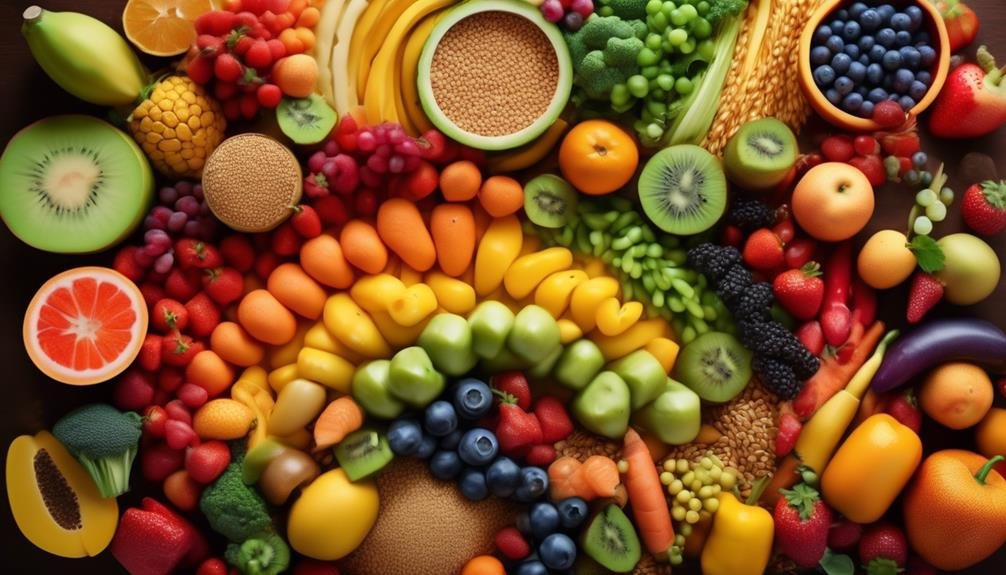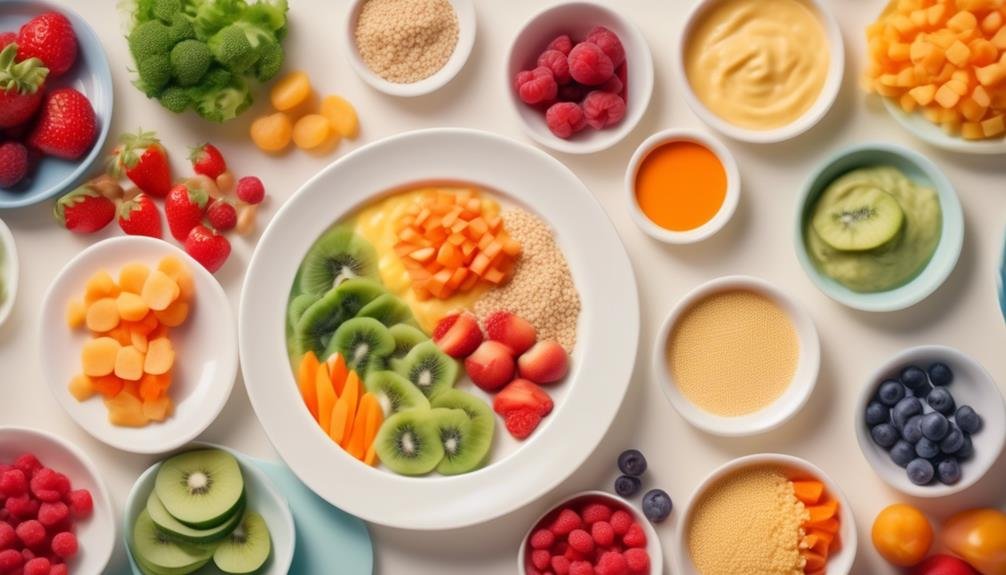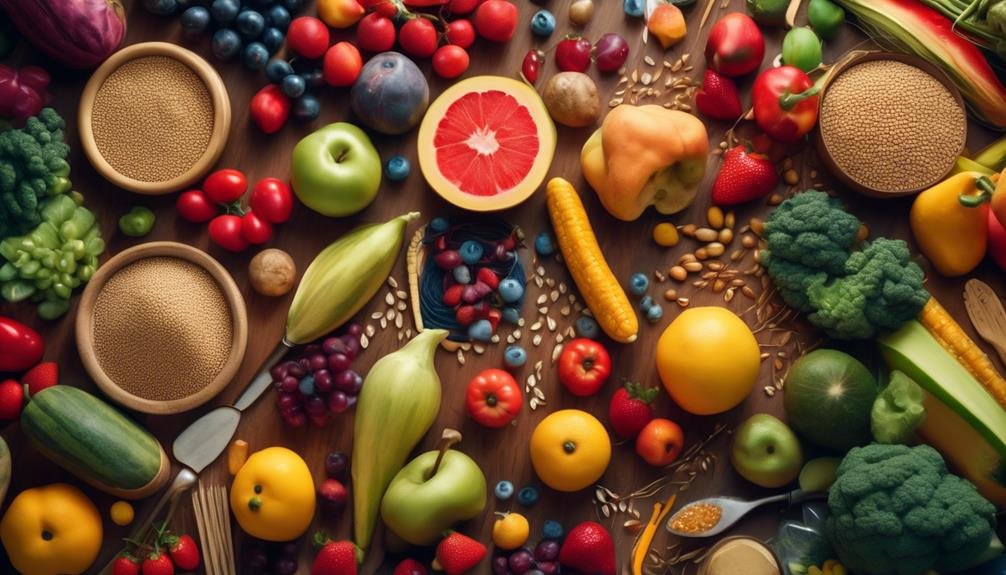"Cherishing Little Steps - A Haven for Baby and Family Journeys"
7 Months: Nutrition Guide
So, you've reached the seventh month milestone with your little one, and now it's time to embark on the exciting journey of introducing solid foods into their diet. But before you dive into the world of purees and mashed fruits, it's important to have a comprehensive nutrition guide to ensure your baby gets all the essential nutrients for their optimal growth and development.
In this discussion, we will explore age-appropriate solid foods, portion sizes, healthy snack ideas, feeding schedules, and address common feeding challenges that you might encounter along the way. Trust us, you don't want to miss out on these valuable insights that will help you navigate this stage with confidence.
Key Takeaways
- Start with pureed fruits and vegetables and gradually introduce soft finger foods.
- Consult with a pediatrician before introducing allergenic foods like peanut butter or eggs.
- Pay attention to portion sizes and offer a variety of nutritious options for snacks.
- Create a calm and relaxing mealtime environment and be patient with your baby's eating habits.
Age-Appropriate Solid Foods

What solid foods are appropriate for your baby's age?
When it comes to introducing allergenic foods and practicing baby-led weaning, it's essential to follow age-appropriate guidelines. At around six months, your baby's digestive system is ready to handle more than just breast milk or formula. You can start by offering pureed fruits and vegetables, such as mashed bananas or sweet potatoes.
As your baby grows, you can introduce more textures and flavors. Around seven to eight months, you can begin incorporating soft finger foods like cooked carrots or small pieces of avocado. This stage is also a good time to introduce allergenic foods like peanut butter or eggs, as research suggests that early exposure can actually help reduce the risk of allergies. However, it's important to consult with your pediatrician before introducing potential allergens.
Baby-led weaning can be a great approach to solid foods, allowing your baby to explore and self-feed. Remember to always supervise your baby during mealtime and offer a variety of nutritious options to support their growth and development.
Introducing New Flavors and Textures
At around seven to eight months, you can introduce new flavors and textures to your baby's diet, expanding their palate and promoting their sensory development. Incorporating variety in their meals is essential for their overall growth and development. Start by introducing mashed or pureed fruits and vegetables, such as banana, avocado, sweet potato, or peas. These provide a range of flavors and textures for your baby to explore. You can also introduce soft cooked grains like rice or oatmeal, which adds a new texture to their meals.
Sensory exploration is crucial during this stage of your baby's development. It helps them become familiar with different tastes, smells, and textures, which can lead to a more adventurous eater in the future. Encourage your baby to touch and feel the food, allowing them to explore it with their hands. This sensory experience can enhance their overall mealtime experience.
As you introduce new flavors and textures, it's important to pay attention to any signs of allergies or sensitivities. Start with one new food at a time and observe your baby's reaction. If there are no adverse effects, you can gradually introduce more variety into their diet. Remember to consult with your pediatrician before introducing any new foods, especially if your baby has a family history of allergies.
Introducing new flavors and textures to your baby's diet not only expands their palate but also promotes their sensory exploration. By incorporating variety and encouraging sensory experiences, you can help your baby develop a lifelong love for healthy eating.
Portion Sizes for Seven-Month-Olds

When considering portion sizes for your seven-month-old, it's crucial to provide them with appropriate amounts of food to support their growth and development. Feeding guidelines can help you navigate this stage and ensure your baby is getting the nutrients they need.
At seven months, your baby's diet should consist of a variety of foods, including fruits, vegetables, grains, and proteins. Start by offering a tablespoon-sized portion of each food item and gradually increase the amount as your baby's appetite grows. Remember to introduce new foods one at a time and watch for any signs of allergies or intolerance.
It's important to note that portion sizes may vary from baby to baby. Some babies may eat more or less than others, and that's perfectly normal. Trust your baby's hunger and fullness cues and avoid forcing them to finish a certain amount of food.
As your baby continues to grow, their portion sizes will increase. By the time they reach their first birthday, they should be eating about three meals a day, along with two to three snacks. Remember to offer a variety of foods to ensure they're getting a well-rounded diet.
Healthy Snack Ideas for Your Baby
To continue supporting your baby's growth and development, let's explore some healthy snack ideas that are perfect for their age.
Introducing solid foods to your baby can be an exciting time, and it's important to offer nutritious options that are appropriate for their stage of development. Here are three snack ideas that aren't only tasty but also promote healthy eating habits:
- Baby-led weaning: Instead of purees, you can offer soft finger foods that your baby can hold and feed themselves. Try steamed carrot sticks, avocado slices, or small pieces of ripe banana. These options encourage self-feeding and help develop your baby's fine motor skills.
- Homemade baby food: Making your own baby food allows you to have control over the ingredients, ensuring that your baby gets all the nutrients they need. Puree cooked sweet potatoes, apples, or peas for a delicious and nutritious snack. You can also mix different fruits or vegetables for added variety.
- Yogurt and fruit: Yogurt is a great source of calcium and protein for your baby. Opt for plain, unsweetened yogurt and mix in mashed or pureed fruits like berries, peaches, or mangoes. This combination provides a balanced snack with added natural sweetness.
Remember to introduce new foods one at a time and watch for any signs of allergies or sensitivities. Enjoy this exciting stage of your baby's food journey and have fun exploring different snack options together!
Mealtime Routines and Feeding Schedules

Establishing a consistent mealtime routine and feeding schedule is crucial for promoting healthy eating habits in your baby. By following mealtime strategies and creating a positive feeding environment, you can help your baby develop good eating habits that will last a lifetime.
One important strategy is to offer meals and snacks at regular times throughout the day. This helps your baby's body get used to a routine and promotes a healthy appetite.
It's also important to create a calm and relaxing environment during mealtime. Minimizing distractions, such as turning off the TV or putting away electronic devices, can help your baby focus on eating.
When introducing new foods, it's best to offer them during regular mealtime rather than as snacks. This allows your baby to fully experience and explore the new food without distractions.
It's also important to be patient and give your baby plenty of time to eat. Babies have small stomachs and may need multiple exposures to a new food before accepting it.
Nutrient-Rich Foods for Optimal Growth
Including nutrient-rich foods in your baby's diet is essential for promoting optimal growth and development. Here are three key options to consider:
- Fiber-rich options: Introducing fiber into your baby's diet is crucial for maintaining a healthy digestive system. Offer foods like mashed avocado, cooked sweet potatoes, and pureed prunes. These options provide essential nutrients and are gentle on your baby's developing digestive system.
- Protein sources: Adequate protein intake is vital for your baby's growth and development. Introduce pureed meats, such as chicken or beef, as well as mashed beans and lentils. These options are excellent sources of protein and provide essential amino acids necessary for muscle and tissue growth.
- Nutrient-dense fruits and vegetables: Including a variety of colorful fruits and vegetables will ensure your baby receives a range of vitamins and minerals. Pureed carrots, bananas, and peas are excellent options to start with. As your baby progresses, introduce new fruits and vegetables like pureed spinach, blueberries, and butternut squash.
Remember to offer new foods one at a time, watching for any signs of allergies or intolerance. As always, consult with your pediatrician for guidance specific to your baby's needs.
Common Feeding Challenges and Solutions

Feeding your baby can come with its fair share of challenges, but with some practical solutions, you can navigate them successfully. Two common feeding challenges you may encounter are dealing with fussy eaters and managing food allergies.
Fussy eaters can be frustrating, but it's essential to remember that it's a normal part of your baby's development. They may refuse certain foods or show a preference for specific textures or flavors. To overcome this challenge, try offering a variety of foods and flavors to expose your baby to different tastes. Offer small portions and be patient, as it may take several tries before they accept a new food. Remember not to force-feed your baby and respect their hunger and fullness cues.
Food allergies are another common challenge parents face. It's crucial to introduce new foods one at a time, waiting a few days before introducing another, to identify any potential allergies. Look out for signs such as rash, hives, vomiting, or difficulty breathing. If you suspect a food allergy, consult your pediatrician immediately. They may recommend allergy testing or refer you to a specialist.
Frequently Asked Questions
How Can I Encourage My Baby to Try New Flavors and Textures?
To encourage your baby to try new flavors and textures, introduce a variety of foods gradually. Offer a range of tastes and textures, like purees, mashed foods, and soft finger foods. Be patient and keep offering different options to develop their adventurous eating habits.
What Are Some Healthy Snack Ideas for My Seven-Month-Old?
When it comes to introducing finger foods and providing healthy snack alternatives for your seven-month-old, there are several options you can try. Here are some nutritious snack ideas to consider.
How Often Should I Feed My Baby and What Should Their Mealtime Routine Look Like?
You should feed your baby on a regular schedule, aiming for around 3 meals a day. Start by introducing solid foods gradually, offering a variety of healthy options. Establishing a mealtime routine will help create a sense of consistency and familiarity for your little one.
Are There Any Specific Nutrient-Rich Foods That Are Recommended for Optimal Growth in Babies?
You'll want to introduce nutrient-rich foods to promote optimal growth in your little one. Exploring new flavors and textures in their diet is important for their development.
What Are Some Common Feeding Challenges That Parents Face With Their Seven-Month-Olds and How Can They Be Resolved?
Feeding challenges with seven-month-olds can include refusing solids and inconsistent feeding schedule. To resolve, offer a variety of textures and flavors, be patient, and establish a routine. Seek guidance from a healthcare provider if concerns persist.
Conclusion
In conclusion, introducing age-appropriate solid foods and varying flavors and textures is crucial for the healthy development of a seven-month-old. It's recommended to offer small portions and incorporate nutrient-rich foods to ensure optimal growth.
Additionally, establishing mealtime routines and feeding schedules can help create a positive eating environment.
Did you know that studies show that babies who are exposed to a wide variety of flavors early on are more likely to accept a diverse range of foods later in life?


